新概念英语第一册1-8课课件
新概念英语第一册101-102课件(共27张PPT)
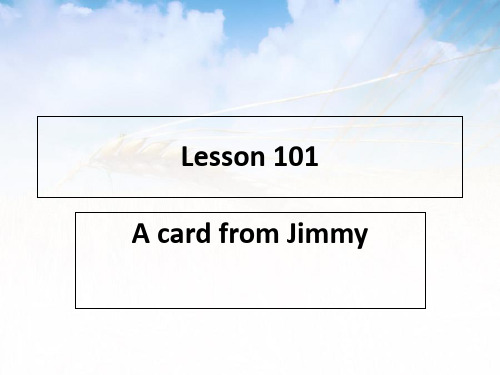
• He doesn’t say very much, does he?
• 反意疑问句
• 由两部分组成,前面是一个陈述句,后面 是一个简略问句,中间用逗号隔开,反意 疑问句可以用来确认自己的判断,还可以 用来表示惊讶,愤怒等感情
• 如果前一部分陈述句是肯定形式,简略问 句就要用否定形式
• hostel /'hɒstl/
n. 招待所,旅馆
• association /əˌsəʊʃi'eIʃn/
n. 协会
• soon
adv. 不久
• write(wrote, written) v. 写
大不列颠及北 爱尔兰联合王国 the United Kingdom of Great Britain and Northern Ireland
park, the station)(小地点) • 我们十分钟前到达机场。
• We arrived at the airport the minutes ago.
• 他们刚刚到这个旅馆。
• They have just arrived at the hotel.
Text (2)
"I have just arrived in Scotland and I'm staying at a Youth Hostel."
•
14、 意 志 坚 强 的人 能把世 界放在 手中像 泥块一 样任意 揉捏。 2021年 8月7日 星期六 2021/8/72021/8/72021/8/7
•
15、 最 具 挑 战 性的 挑战莫 过于提 升自我 。。2021年 8月 2021/8/72021/8/72021/8/78/7/2021
新概念英语第一册复习课件
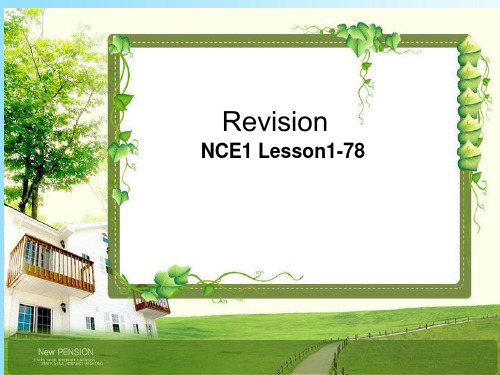
形容词 名词前,be动词后
• dirty-clean sharp-blunt good-bad • lazy—hard-working busy-free • same-different • comfortable-uncomfortable • smart lovely tired thirsty terrible fresh
tobacco stereo refrigerator electric cooker hammer kettle teapot envelope pad change photograph passport fashion appointment noise • 学校:chalk handwriting subject conversation phrasebook • 房子:building cloakroom • 方位:middle north south east west • 疾病: temperature flu measles mumps aspirin
新概念英语第一册复习课件
• 星期:week Sunday Monday Tuesday Wednesday Thursday Friday Saturday weekend
• 季节:season spring summer autumn winter • 地点:village church dairy town • 生活:case carpet fork spoon cupboard cigarette
• 五号 • 一个新学生 • 电脑操作员 • 工程师 • 空姐 • 我女儿的 • 上楼 • 相同的颜色 • 一顶可爱的帽子 • 推销员
新概念英语第一册复习课件
• office assistant • customs officer • taxi driver • an ice cream man • the dressing table • the stereo • on the right • on the left • in the middle of • put on
新概念英语第一册1-10课件(共152张PPT)
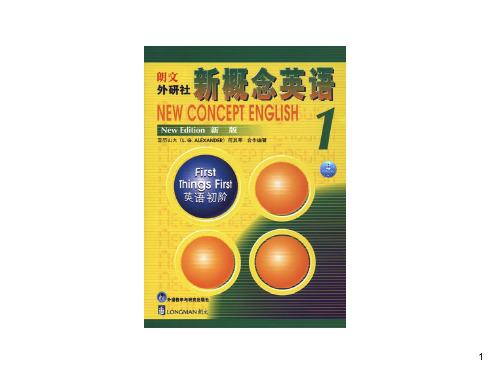
80
•
•
PK
81
你认识下面的车吗?
82
83
生活百科-汽车品牌3
84
chevrolet
85
Cadillac
86
Porsche
87
Buick
88
Nissan
89
BMW
90
Skoda
91
Ferrari
92
L7 Are you a teacher?
93
New word and expressions
74
• This is Mr Lin Dan. • Chinese / Japanese
×
√
• Is he a Chinese sportsman or a Japanese sportsman?
• He isn’t a Japanese sportsman. He’s a Chinese sportsman.
28
PK 2-1
29
PK 2-2
30
New word and expressions
umbrella
number
please
five
here
sorry
my
sir
ticket
cloakroom
suit
son
school
daughter
teacher 31
句型训练
• My coat and my umbrella please. • [SP1] • My A and my B please. • A和B应有一定的联系。
50
What are their nationalities?
新概念英语第一册课完整版
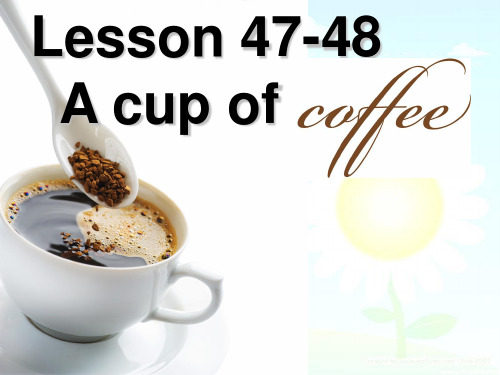
• My shoes want cleaning. • 我的鞋需要擦擦了。
Language Points
sth.
sth.
1.like to do sth. 2.want to do sth.
doing sth.
sb. to do sth.
“I like coffee. Do you like coffee?”
A: Yes, please.
再次熟读课文,填空
Lesson 48 Do you like…? Do you want…?
fresh
• fresh air • 新鲜空气 • fresh fruit • 新鲜水果 • Fresh news • 最新的消息 •
adj.新鲜的
egg
n.鸡蛋
• 我想要一些鸡蛋。 一般疑问句 • I want some eggs. • ---Do you want any eggs?
• I want a kiss. • I want not a kiss. ×
• do功能2: • (2) 构成否定句。 • 如何正确变形? • He likes coffee. • He does not like coffee.√
• I want a kiss. • I do not want a kiss. √
CHRISTINE: Do you like biscuits?
ANN:
Yes. I do.
CHRISTINE: Do you want one?
ANN:
Yes, please.
3. some和any 用法:
既可以修饰可数名词
又可以修饰不可数名词 some 常用在肯定句中译为“一些”
新概念英语第一册课文1-143
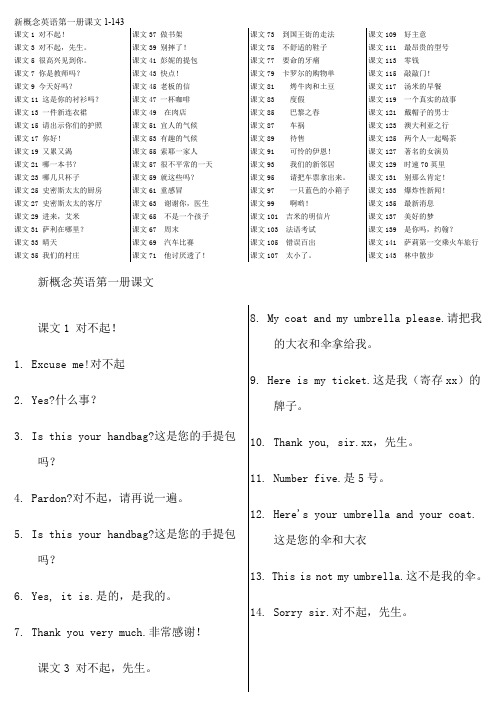
课文1 对不起!课文3 对不起,先生。
课文5 很高兴见到你。
课文7 你是教师吗?课文9 今天好吗?课文11 这是你的衬衫吗?课文13 一件新连衣裙课文15 请出示你们的护照课文17 你好!课文19 又累又渴课文21 哪一本书?课文23 哪几只杯子课文25 史密斯太太的厨房课文27 史密斯太太的客厅课文29 进来,艾米课文31 萨利在哪里?课文33 晴天课文35 我们的村庄课文37 做书架课文39 别摔了!课文41 彭妮的提包课文43 快点!课文45 老板的信课文47 一杯咖啡课文49 在肉店课文51 宜人的气候课文53 有趣的气候课文55 索耶一家人课文57 很不平常的一天课文59 就这些吗?课文61 重感冒课文63 谢谢你,医生课文65 不是一个孩子课文67 周末课文69 汽车比赛课文71 他讨厌透了!课文73 到国王街的走法课文75 不舒适的鞋子课文77 要命的牙痛课文79 卡罗尔的购物单课文81 烤牛肉和土豆课文83 度假课文85 巴黎之春课文87 车祸课文89 待售课文91 可怜的伊恩!课文93 我们的新邻居课文95 请把车票拿出来。
课文97 一只蓝色的小箱子课文99 啊哟!课文101 吉米的明信片课文103 法语考试课文105 错误百出课文107 太小了。
课文109 好主意课文111 最昂贵的型号课文113 零钱课文115 敲敲门!课文117 汤米的早餐课文119 一个真实的故事课文121 戴帽子的男士课文123 澳大利亚之行课文125 两个人一起喝茶课文127 著名的女演员课文129 时速70英里课文131 别那么肯定!课文133 爆炸性新闻!课文135 最新消息课文137 美好的梦课文139 是你吗,约翰?课文141 萨莉第一交乘火车旅行课文143 林中散步新概念英语第一册课文课文1 对不起!1. Excuse me!对不起2. Yes?什么事?3. Is this your handbag?这是您的手提包吗?4. Pardon?对不起,请再说一遍。
新概念英语第一册8课课件

17
课文讲解
5. Dinner n. 晚餐
➢ It’s time for dinner. ➢ 是吃晚餐的时候了. ➢ Enjoy your dinner. 慢慢享用晚餐. ➢ Dinner party 社交晚宴
20
课文回顾 He’s _____u__p_s_ta__ir_s_______. 他在楼上。 He’s_____h_a__v_in_g__a__b__a_th________. 他正在洗澡。 I’m __n_e__a_r_ly__r_e_a_d_y____. 我马上就好。
21
课文回顾 __H_a__v_e__ a cigarette. 请抽烟 ___H__a_v_e_____a cup of tea. 来杯茶吧。 We can _H__a_v_e__d_i_n_n_e_r__ at seven o’clock. 7点钟我们可以吃饭。
4
复习
我们还有面包吗? Have we got any bread? 你们还有啤酒吗? Have you got any beer? 我希望你还有钱. I hope that you’ve got some money.
5
课文讲解 Listen to the tape and answer the
10
2. ★ have ➢Take a shower
洗澡
11
2. ★ have
have (吃,喝)
breakfast lunch dinner a meal a cake a cup of coffee tea a cigarette
新概念英语第一册1
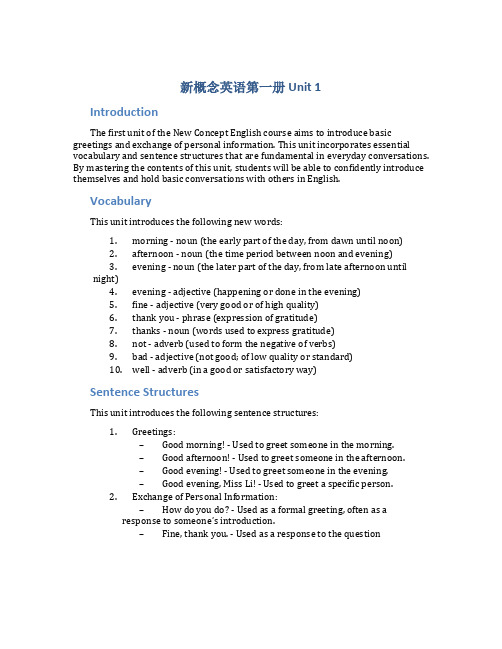
新概念英语第一册 Unit 1IntroductionThe first unit of the New Concept English course aims to introduce basic greetings and exchange of personal information. This unit incorporates essential vocabulary and sentence structures that are fundamental in everyday conversations. By mastering the contents of this unit, students will be able to confidently introduce themselves and hold basic conversations with others in English.VocabularyThis unit introduces the following new words:1.morning - noun (the early part of the day, from dawn until noon)2.afternoon - noun (the time period between noon and evening)3.evening - noun (the later part of the day, from late afternoon untilnight)4.evening - adjective (happening or done in the evening)5.fine - adjective (very good or of high quality)6.thank you - phrase (expression of gratitude)7.thanks - noun (words used to express gratitude)8.not - adverb (used to form the negative of verbs)9.bad - adjective (not good; of low quality or standard)10.well - adverb (in a good or satisfactory way)Sentence StructuresThis unit introduces the following sentence structures:1.Greetings:–Good morning! - Used to greet someone in the morning.–Good afternoon! - Used to greet someone in the afternoon.–Good evening! - Used to greet someone in the evening.–Good evening, Miss Li! - Used to greet a specific person.2.Exchange of Personal Information:–How do you do? - Used as a formal greeting, often as aresponse to someone’s introduction.–Fine, thank you. - Used as a response to the question。
(完整版)新概念英语第一册Lesson_83课件

I don't know. I have already had my holiday this year.
你去哪儿了? 我呆在家里了!
9.Where did you go? I stayed at home.
packing their suitcase. 3. What are Carol and Tom going to do? They are going to have a holiday. 4. When are they going to leave? Tomorrow.
Answer:
Q1:What are Tom and Carol doing? They are having lunch.
1. in a mess
= at sixes and sevens 乱七八糟的(状态或局面) 你的房间乱七八糟的. Your room _is__in_a__m_e_s_s___. 2. What a mess ! 好乱啊!
mess
2) v.弄脏,弄乱 Messy adj. 凌乱的 A messy room Tidy 整洁的 Untidy 不整洁的 介词搭配 Mess in Mess up Mess about
Already 已经(一般放在助动词的后面) She has already arrived the bus stop. 她已经到了公共汽车站。
那么喝杯咖啡吧。我刚喝了一杯,谢谢。我是在饭后喝的。
3.Have a cup of coffee then. I 've just had a cup,thank you. I had one after my lunch.
Lesson121(课件)新概念英语第一册

• 1. This is the girl. The girl served me.
• 2. This is the book. I bought the book.
Exercises before class:把下列句子合并成一个句子。
• 6. 带着一顶帽子
• 7. put it on
• 7. 把它带上
• 8. all right
• 8. 好吧
• 9. recognize him
• 9. 认出他
Phrases:
• 1. The lady who is standing behind the counter. • 2. The books which are on the counter. • 3. He says that he's the man who bought these books. • 4. The man who I served was wearing a hat. • 5. Is this the man that you served?
• 2. half an hour ago
• 2. 半个小时以前
• 3. forget to do
• 3. 忘记做பைடு நூலகம்事
• 4. take sth. with sb.
• 4. 某人随身携带
• 5. stand behind the counter • 5. 站在柜台的后面
• 6. wear a hat
but I f_o_r_g_o(tftoorgtaekt)ettohteamkewtihthemme. with me.
新概念英语第一册Lesson03-04(共16页)-单元音-数字表达PPT课件

sixteen /‘siks’ti:n / 十六
seventeen /sevn‘ti:n, .sevən’ti:n / 十七
eighteen /‘ei’ti:n / 十八
ninetine /‘nain’ti:n/ 十九
-
3
Ways of expressing numbers 数字的表达(三)
148 one hundred and forty-eight
256 two hundred and fifty-six
-
5
Ways of expressing numbers 数字的表达(五)
千位数以上 从数字的右端向左端数起,每 三位数加一个逗号“,”。从右开始,第 一个“,”前的数字后添加 thousand,第二 个“,”前面的数字后添加 million,第三 个“,”前的数字后添加 billion。然后一节 一节分别表示,两个逗号之间最大的数为 百位数形式。
-
11
时刻表示方法(四)
如果所表述的时间在半小时之外,可以用 “(相差的)分钟 + to + (下一)小时”: 一刻钟(十五分)用quarter 如: 3:40 twenty to four 10:35 twenty-five to eleven 5:50 ten to six 9:49 eleven to ten
3. 20—90十位的整数都以-ty结尾,单词的第一个音 节重读。
twenty /‘twenti / 二十
thirty/'θə:ti /
Hale Waihona Puke Forty/'fɔ:ti /
fifty/'fifti /
新概念英语第一册1-8课课件

新概念英语第一册
这里是通过故事、对话的方式, 并且加入游戏的练习环节,为学生 的英语学习打下坚实的基础。
学好它,你一定是同龄人中的强者!
新概念英语第一册内容
一、语音(读音规则,句子的发音技巧)
二、词汇(1400个词汇,听写)
三、课文(多听,多读,模仿,背诵)
See you later. See you next Saturday. Bye for now.
Question: Whose handbag is it?
1.Excuse me! 对不起 1)向陌生人问路 Excuse me.Is there a bakery nearby? 2)在某一聚会或对话中突然中途要离开一会 Excuse me.I want to go to the bathroom. 3)在发生一个简单的不算太错的错误时 Excuse me.This is my bag. 5)引起对方注意时 Excuse me.Can I play with your toys?
• [b] [k] [s] [d] [f] [ ][g] [ ][h] [l] [m] [n] [p] [r] [z] [t] [v] [w] [j] [ ][ ][θ] [ ][tr] [dr] [ts] [dz] [З]
the 是定冠词表示特指 Look,look,a man is coming into the classroom. The man is our teacher. 3.and “也 ”用于肯定句中 My father and mother are very kind. also “也” 用于肯定句中 She is a teacher.I am also a teacher. too “也”,用于肯定句末 He likes playing computer games too. either “也”,用于否定句末 I don’t like eggplant either. but “但是”,表转折 They are rich.But I am poor. 4.初次见面还可以说 -How do you do? -How do you do?
(完整版)新概念英语第一册课文
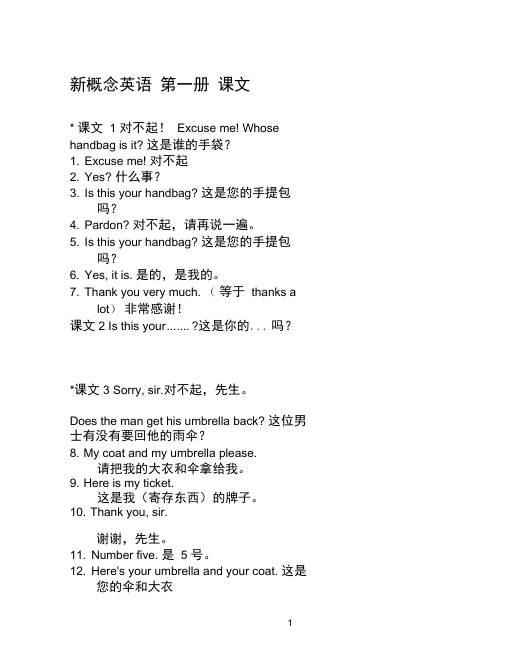
新概念英语第一册课文* 课文 1 对不起!Excuse me! Whose handbag is it? 这是谁的手袋?1. Excuse me! 对不起2. Yes? 什么事?3. Is this your handbag? 这是您的手提包吗?4. Pardon? 对不起,请再说一遍。
5. Is this your handbag? 这是您的手提包吗?6. Yes, it is. 是的,是我的。
7. Thank you very much. (等于thanks alot)非常感谢!课文2 Is this your ....... ?这是你的... 吗?*课文3 Sorry, sir.对不起,先生。
Does the man get his umbrella back? 这位男士有没有要回他的雨伞?8. My coat and my umbrella please.请把我的大衣和伞拿给我。
9. Here is my ticket.这是我(寄存东西)的牌子。
10. Thank you, sir.谢谢,先生。
11. Number five. 是 5 号。
12. Here's your umbrella and your coat. 这是您的伞和大衣13. This is not my umbrella. 这不是我的伞。
14. Sorry, sir. 对不起,先生。
15. Is this your umbrella? 这把伞是您的吗?16. No, it isn't. 不,不是!17. Is this it? 这把是吗?18. Yes, it is. 是,是这把19. Thank you very much. 非常感谢。
*课文4 Is this your ....... ?这是你的.. 吗? *课文 5 Nice to meet you. 很高兴见到你。
Is Chang-woo Chinese ? 昌宇是中国人吗?20. Good morning.早上好。
(完整版)新概念英语第一册1-10课件(共152张PPT)
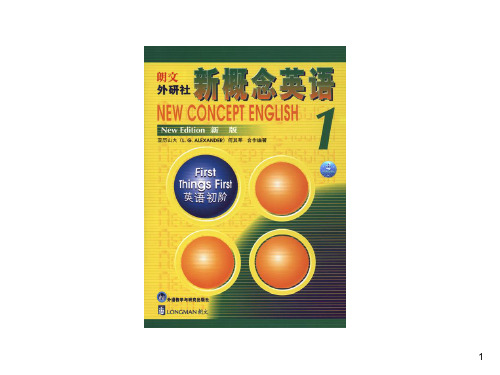
L3 Sorry, sir
• Does the man get his umbrella?
26
New word and expressions
umbrella cloak
ticket cloakroom
27
New word and expressions
suit
school
teacher
son daughter
12
Bags (包包大聚会)
handbag wallet
schoolbag purse
13
Bags (包包大聚会)
suitcase
backpack
mobile phone bag computer bag 14
包包大比拼2-1
15
包包大比拼2-2
16
生活百科-世界名包系列
LV 路易·威登
古琦
key
keyboard
keyboard operator
engineer 94
New word and expressions
I
nationality
am
job
are
keyboard
name
operator
what
engineer
95
学一学
• 今天我们要学习一类名词—— 职业。
• 名词的英文是noun. • 缩写为n.
Mr
German
good
nice
morning
meet
Miss
Japanese
new
Korean
student
Chinese
French
too
49
精品课件:新概念英语第一册 lesson1

New Word and expressions生词和短语
3. handbag : ['hændbæg] n. 1). (女用)手提包
2). 小旅行袋,旅行包
4. pardon:[‘pɑ:dn] n. 原谅,宽恕
多用于请对方重复一次说过的话
Pardon?
对不起,请再说一遍。
正式说法: I beg your pardon.
Is this your........?
pen 钢笔
watch 手表
pencil 铅笔
car 汽车
skirt 短裙
dress 裙子
3、Pardon? 声调,用来表示自己没有听过清楚,希 望对方再说一遍。 这是缩略形式,完整形式是: I beg your pardon?
It is 在一起的时候,要连读。It以辅音结尾,is 以元音开头。
4、Yes,it is. 是的,它是。 这句话是一般疑问句的肯定表达。 No,it is not. / it isn’t. 这句话是一般疑问句的否定表达。
对不起,很抱歉。常用于做错事, 或伤害到别人,或表示遗憾,请求 原谅。
Excuse me
1. 向陌生人问路时: Eg: 不好意思,请问电影院怎么走? 2. 引起对方注意时: Eg: 不好意思,这个玩具给我玩一下? 3. 在某一聚会或对话中突然中途要离开一会儿: Eg: 不好意思,我要去趟洗手间。 4. 在发生一个简单的不算太错的错误时。 Egndbag.
can answer the question -----
Whose handbag
is it?
课
• • • • • • •
文
对不起,打扰一下。 什么事?
新概念第一册7-8课课件PPT

课堂活动
积极参与课堂活动,如小组讨论、 角色扮演或即兴演讲等,提高口
语表达能力。
课外实践
参加英语角、英语演讲比赛或志 愿者活动等课外实践,提高口语
表达的实际应用能力。
自我评估
对自己的口语表达能力进行自我 评估,找出不足之处并制定改进
计划。
05
阅读理解训练
阅读材料解析
文章主题
本部分将详细解析7-8课中的阅读材料,包括文章背景、主要内容 和思想观点等。
注意段落的结构
总结词
段落是构成文章的基本单位,一个段落应该有一个中心思想,段落中的句子应该围绕这个中心思想展开。
详细描述
在写作中,每个段落应该有一个明确的主题或观点,段落中的句子应该围绕这个主题或观点展开。段落 的开头应该明确提出主题或观点,段落的结尾可以是对主题或观点的总结或进一步阐述。
写作练习题
练习1
写一篇关于“我的家乡”的短文,要求使用至少三个连词。
练习2
写一篇关于“我的爱好”的短文,要求使用至少两种不同的句子结 构。
练习3
写一篇关于“我的理想”的短文,要求段落结构清晰,每个段落有一 个明确的主题或观点。
写作范文展示
范文1:我的家乡
我的家乡是一个美丽的小镇,那里有清澈的河流、绿树成荫的街道和友好的人们 。我喜欢在河边散步,欣赏着美丽的风景。而且,小镇上还有许多有趣的活动和 节日,每年都会吸引许多游客前来参观。
06
写作技能提升
写作技巧解析
写作技巧1:学会使用连词
总结词:连词是连接句子和句子的词语,使用连词可以让文章更加流畅和连贯。
详细描述:在写作中,适当使用连词如“and”、“but”、“or”、“so”等,可 以使句子之间的逻辑关系更加清晰,让读者更容易理解文章的内容。
新概念英语第一册38课PPT课件
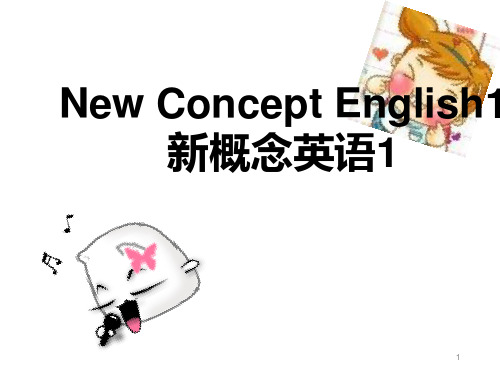
nguage points
Country 国家/乡村 country music 乡村音乐 nationality 国籍 capital首都 homeland/motherland 祖国 What nationality are you?你是哪国人? I am Chinese/a Chinese.
[ ][ ][θ] [ ][tr] [dr] [ts] [dz] [З]
17
•the 是定冠词表示特指 •Look,look,a man is coming into the classroom. •The man is our teacher. •3.and “也 ”用于肯定句中 •My father and mother are very kind. •also “也” 用于肯定句中 •She is a teacher.I am also a teacher. •too “也”,用于肯定句末 •He likes playing computer games too. •either “也”,用于否定句末 •I don’t like eggplant either. •but “但是”,表转折 •They are rich.But I am poor. •4.初次见面还可以说 •-How do you do? -How do you do?
4.number=no.
5.Mr.先生 Mrs.夫人
Ms.女士 Miss小姐
Sir:对男士一种比较有礼貌的称呼或学生
对男性老师的一种称呼或下级对上级的
一种称呼。
4
gentleman,对男性比较有礼貌 的称呼,在公共场合最得体的称 呼。 guy在美国英语中对男性一种不 正式的称呼,家伙
5
6Is Luming a Korean student or a Chinese student?
新概念第一册第1&2课精品课件

Is this your dress?
疑问句
肯定回答: 否定回答: Yes, it is. No, it isn’t.
skirt / sk3:t / n. 短裙
这是你的短裙吗?
Is this your skirt?
疑问句
肯定回答: 否定回答: Yes, it is. No, it isn’t.
shirt / ʃ3:t / n. 衬衫
一、单词讲解
2. is /iz/ v. be 动词单数第三人称
is He _____ a student.
am, is , are
You are _____ happy. am a teacher. I _____
缩写形式: He’s He is =________ You’re You are=_______ I’m I am=______
你爱我。
You love me.
You love I. me: 表示宾语的“我” 在主谓宾结构中,宾语位置上放上“我”这个代词, 选择me I----- 代词“我”的“主格” me——代词“我”的“宾格”
e.g. 我爱妈妈。 I love mother. I love her. 我爱她。
形容词性物主代词
8. thank you
9. very much
/θæŋk-ju:/
/ `veri-mʌtʃ /
感谢你(们)
非常
8. thank you
要感谢某人
1) Thank you.
2) Thanks.
3) Thank you very much. 要感谢某人 4) Thank you a lot.
(注意:不可以单独使用 Thank) 对于感谢的回答:
新概念英语第一册第7-8课PPT

单词讲解
• keyboard: computer keyboard • operator n. 操作人员 operate v. 操作 operator= operate+or 即,动词结尾+or=人
e.g 主导者director=direct指挥,指导+or
演员actor=act表演+or
课文讲解
• too“也”,用于肯定句和疑问句的句末, 用逗号和前面句子隔开; either “也”,用于否定句的句末,用逗号 和前面的句子隔开。 • e.g Miss Sophie Dupont is French, too. (变成否定句,一般疑问句) Miss Sophie Dupont isn’t French, either. Is Miss Sophie Dupont French, too?
Lesson 8 What is Robert’s job?
policeman
What’s your job? I’m a policeman.
policewoman
What’s your job? I’m a policewoman.
taxi driver
What’s your job? I’m a taxi driver.
4.What nationality are you ?你是哪国人?
回答:I’m +国籍. Eg:I’m Chinese. Where do you come from? I come from +国家. Eg:I come from China. Where are you from? I’m from+国家. Eg:I’m from China.
air hostess airnan
- 1、下载文档前请自行甄别文档内容的完整性,平台不提供额外的编辑、内容补充、找答案等附加服务。
- 2、"仅部分预览"的文档,不可在线预览部分如存在完整性等问题,可反馈申请退款(可完整预览的文档不适用该条件!)。
- 3、如文档侵犯您的权益,请联系客服反馈,我们会尽快为您处理(人工客服工作时间:9:00-18:30)。
学习交流PPT
14
D. 名词性物主代词常用来代替前面已提 及的名词,相当于“形容词性的物主代词 +名词”。如:
My shoes are quite different from hers. 我的鞋和她的完全不一样。
名词性物 mine ours yours yours his hers its theirs 主代词
学习交流PPT
13
A.人称代词的主格在句中充当主语。如 She is active. B.人称代词的宾格在句中充当动词、介 词的宾语或表语。如:
I don't know her. It's me . C.形容词性的物主代词在句中做定语修 饰名词,一般不单独使用。如:
学习交流PPT
7
Greetings见面问候语
---How are you?
---Pretty good.非常好。 ---Just so-so.一般 ---Not too bad.还不坏。 ---Couldn't be better.不能再好了! ---I'm just my oldself.我还是老样子 。
学习交流PPT
17
6.含有be动词简单的陈述句,否定句, 一般疑问句
It is my handbag. 否定句 be+not
This is not my handbag. 一般疑问句 be提到句子的前面大写 Is this my handbag?这是我的手提包 吗?
Is this your handbag?,
1.Excuse me! 对不起 1)向陌生人问路 Excuse me.Is there a bakery nearby? 2)在某一聚会或对话中突然中途要离开一会 Excuse me.I want to go to the bathroom. 3)在发生一个简单的不算太错的错误时 Excuse me.This is my bag. 5)引起对方注意时 Excuse me.Can I play with your toys?
Yes,it is.
No,it's not.
学习交流PPT
18
7.Pardon? 对不起,请再说一遍。 I beg your pardon. I beg your pardon? Pardon me?=What did you say?
学习交流PPT
4
Study hard and keep fit. 好好学习,天天向上!
学习交流PPT
5
Lesson1 Excuse me!
Part1:Introduce yourself介绍自己 Hello!
My name is…
I'm…years old.
What's your name?
学习交流PPT
学习交流PPT
9
Goodbye./Byebye./See you.
See you later. See you next Saturday. Bye for now.
学习交流PPT
10
Question: Whose handbag is it?
学习交流PPT
11
New words and expressions
6
Greetings见面问候语
Hello/Hi!/How do you do? Good morning/afternoon/evening!
---How are you?/How are you doing? ---Fine/Well.Thank you.And you? ---I'm very well too.Thanks.
三、课文(多听,多读,模仿,背诵)
四、语法(记笔记,做练习)
Nothing to fear but fear itself.
除了恐惧本身之外学习交没流PPT 有什么可恐惧的。
3
大胆说出我们的自信
Believe in your dreams. 相信你的梦想。 Believe in today. 相信今天。 Believe that you make a difference. 相信你与众不同。 Believe when others might not. 相信当别人不相信自己时。
学习交流PPT
8
Nice/Glad/Pleased to see/meet you! meet强调第一次见面. see强调第二次见面,老朋友见面。
Nice to see you ,too./Same here. 见到你也很高兴。/我也很高兴。
Long time no see. 很长时间没有见到你了。
hers=her shoes
3.Yes读降调表示对某件事的认同,读 声调表示询问。
学习交流PPT
15
4.v. verb动词 adj. adjective形容词 adv. adverb副词 pron. pronoun代词 prep. preposition介词 n. noun名词 conj. Conjunction连词
Sorry对不起,用于对别人有伤害时。
I’m sorry.I broke your学习b交i流kPPeT .
12
2.
第一人称 第二人称
第三人称
单数 复数 单数 复数
单数
复数
主格
I We you you he She it they
宾格
me us you you him her it them
形容词性 my our your your his her its their 物主代词
New Concept English1 新概念英语1
学习交流PPT
1
新概念英语第一册
这里是通过故事、对话的方式, 并且加入游戏的练习环节,为学生 的英语学习打下坚实的基础。
学好它,你一定是பைடு நூலகம்龄人中的强者!
学习交流PPT
2
新概念英语第一册内容
一、语音(读音规则,句子的发音技巧)
二、词汇(1400个词汇,听写)
学习交流PPT
16
5.be动词am, is, are I am a teacher. He/She/Matt/Your father is happy. We/You/They/Tom and Jim are happy I'm=I am you're=you are Tom's=Tom is it's=it is we're=we are he's=he is
